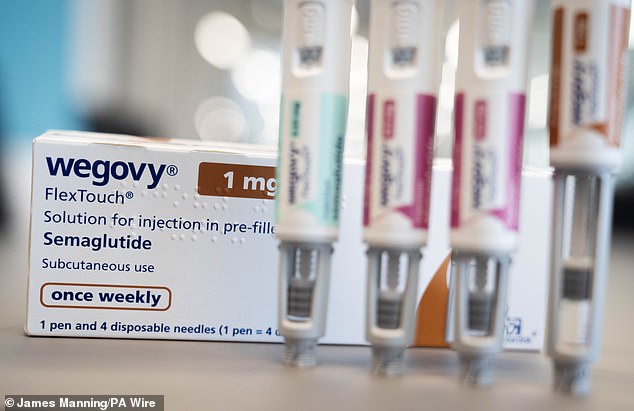Two of the world’s most popular slimming injections may raise the risk of a sight-threatening eye disease in people with type 2 diabetes, researchers have warned.
A team from Massachusetts analysed health records from more than 185,000 patients prescribed GLP-1 receptor agonist drugs—a class that includes semaglutide, the active ingredient in Wegovy, and tirzepatide, found in Mounjaro.
These medications suppress appetite and are increasingly used by people with diabetes and obesity to shed pounds and control blood sugar levels.
But the study found they were linked to a ‘modestly increased risk’ of diabetic retinopathy—a condition caused by damage to blood vessels in the retina, the light-sensitive layer at the back of the eye.
Left untreated, it can lead to permanent sight loss.
Even so, the researchers noted that fewer people in the study developed the most severe complications of diabetic retinopathy, such as blindness, even among those who already had the condition before starting the drugs.
The analysis also found no statistically significant difference in the risk of NAION—non-arteritic anterior ischaemic optic neuropathy—a rare disorder that causes sudden vision loss in one eye when blood flow to the optic nerve is cut off.
Based on their findings, the authors said people with type 2 diabetes taking the drugs should have regular eye checks to catch any problems early.

There were two studies published today on the link between sight loss and the weight loss jabs
The researchers behind the Massachusetts study disclosed conflicts of interest with companies that manufacture the drugs, including Eli Lilly and Novo Nordisk.
Separately, another US research team—whose findings were also published today—analysed data from 159,398 people and did find an increased risk of sudden sight loss linked to the injections.
They looked specifically at patients with type 2 diabetes and no history of eye problems, comparing those prescribed semaglutide or tirzepatide with a matched control group.
Their results showed an increased risk of NAION—non-arteritic anterior ischaemic optic neuropathy—and other optic nerve disorders in the medicated group, although they stressed the ‘overall risk was low.’
After two years of follow-up, 35 patients (0.04 per cent) in the semaglutide or tirzepatide group had developed NAION, compared to 19 patients (0.02 per cent) in the control group.
In addition, 93 patients (0.12 per cent) in the medicated group developed other optic nerve disorders, versus 54 patients (0.07 per cent) in the control group.
The researchers added: ‘No association was found with other disorders of the optic nerve or visual pathways.’
In this second study, the researchers didn’t disclose any conflicts of interests with weight loss jab manufacturers.
Your browser does not support iframes.
The weight-loss jabs have been found to help people lose up to 20 per cent of their body weight in just a few months.
However, there have been numerous reports of side effects after getting the jabs from hair loss and constipation to extreme cases of bloating.
Recently, US experts found that semaglutide—may ‘waste away muscles’, making it harder to lose weight.
And earlier this summer, in June, slimming jabs like Mounjaro and Wegovy were linked to more than 100 deaths in Britain.
A total of 111 deaths were logged with the regulator, the Medicines and Healthcare products Regulatory Agency (MHRA), up to and including May 29.
But none of the fatalities, which have all been reported since the jabs were licensed for use in the UK, were proven to be caused directly by the drugs.
However, the UK medicines regulator launched a probe into the safety of fat jabs after hundreds of Britons developed pancreatitis, specifically, leaving ten dead.
Nevertheless, the weight loss jabs have remained popular, with pharmacists warning just last month that booming demand may become ‘unsustainable’.
The warning was issued by The National Pharmacy Association (NPA)—which represents over 6,000 community pharmacies.
It came after their recent poll of over 2,000 people showed an increasing demand for private and NHS-backed weight loss services.
The NDA poll revealed a fifth of participants had attempted to access weight loss treatments in the last year.